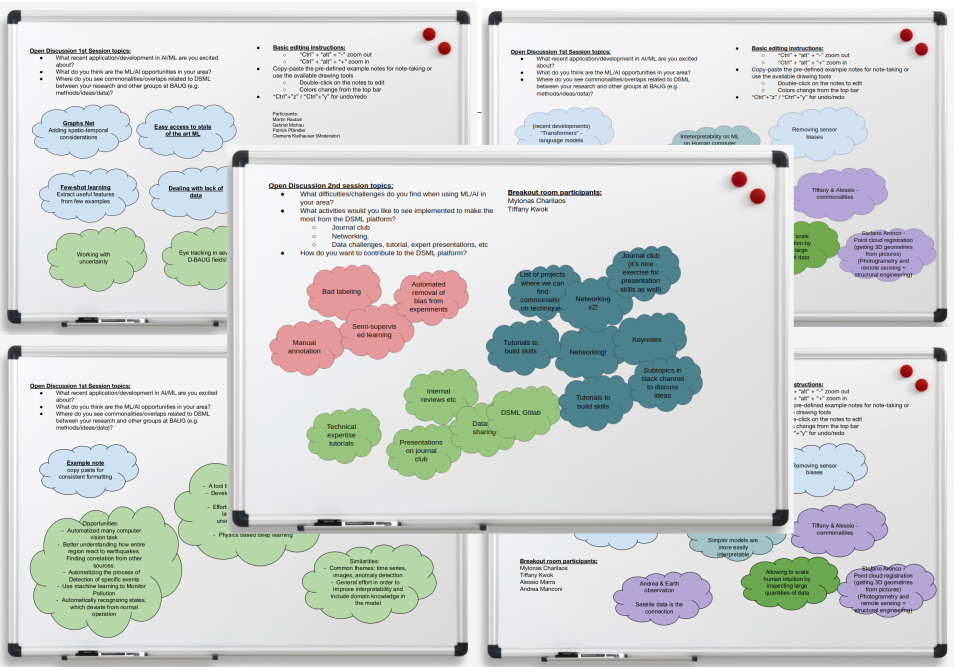Data Science and Machine Learning at D-BAUG
An increasing number of researchers within D-BAUG recognizes the potential in adopting Data Science and Machine Learning (DSML) as enabling tools in their research. This has led to an initiative to establish a Collaboration Platform for Data Science and Machine Learning @ DBAUG, where researchers can join their efforts in applying and advancing DSML tools.

On 4th of September 2020, more than 50 researchers from D-BAUG came together for a kick-off meeting to present the ongoing DSML related research at D-BAUG and to discuss the potential of the DSML Collaboration Platform.
The presented work included examples from remote sensing, geospatial analysis, structural and environmental engineering, asset management, condition monitoring and intelligent maintenance, surrogate modelling and transportation modelling, illustrating the high diversity of possible applications of DSML algorithms in civil, geomatic and environmental engineering. As one of the participants stated: “DSML is a computational Swiss Army knife!”.
The attendees of the kick-off meeting discussed and shared their perspectives on how they see the challenges and potential application of DSML algorithms in their research areas.
Some recent developments in the DSML domain were found to be of increased shared interest, including Graph Neural Networks and Physics-informed Neural Networks. Interpretability of DSML models and the ability to work with different data types and limited data sets also came across as important.
D-BAUG researchers are keen in applying the DSML algorithms to spatial and temporal data, for handling large datasets, and tackling natural hazards and optimal decision-making for specific engineering problems. These engineering-driven topics are not necessarily a focus of the broader DSML research community, that might be invested in computationally more efficient algorithms or further theoretical developments. In this sense, researchers from specific domains must take matters into their own hands and develop the DSML field further from the application point of view.
But they are not alone, there is a big potential for collaboration between D-BAUG members from different research groups. Recognized overlaps in the application of DSML tools at D-BAUG are that many problems require handling of different time and spatial scales and large datasets, uncertainty quantification, model dimensionality reduction, sensitivity analysis, an increase in the interpretability of DSML models, inducing physics-based knowledge into purely data-driven models, removing expert bias from the data, use of similar data types and the techniques to overcome lack or poor quality of data.
As with anything new and unexplored, there are many challenges that need to be overcome before the society can benefit from the research done at D-BAUG. Researchers pointed out that it is difficult to keep track of such a large and fast-evolving field – new DSML algorithms are being proposed on a weekly basis. One can feel overwhelmed by the sea of possibilities, hence, finding the right tool for the job might not be so easy. Furthermore, the lack and quality of data is a major obstacle and without good data, there can be no data science! Additionally, DSML application requires technical skills, such as programming and learning how to use existing DSML libraries (e.g., PyTorch, TensorFlow). Even though there exist several tutorials and online teaching resources, mastering these tools requires time, especially since most researchers are not trained programmers, but engineers.
This is where the DSML Collaboration Platform can help. By coming together, researchers can help each other navigate through these obstacles and even get new ideas in the process! Participants of the kick-off meeting proposed numerous forms of networking both within and outside D-BAUG. Brainstorming meetings over lunch or coffee can help to share knowledge in an informal environment, while Summer Schools or lectures by DSML experts can serve the same purpose, in a slightly more formal setting. Internal Hackathons and ML challenges can be organized, as an alternative to the Kaggle competitions. Alternatively, teams composed of D-BAUG researchers could apply for external DSML competitions, increasing the visibility of the department in the DSML community. A Data platform where groups can share their datasets was also suggested. To tackle the technical side of the issue, workshops and tutorials could be organized by D-BAUG researchers with some expertise in the DSML field or by external experts. An expert advisory board, assembled from more experienced D-BAUG members was also suggested to help researchers that would like to apply DSML tools but do not yet have an overview of the DSML field, and hence cannot find the proper tools. A DSML Gitlab/GitHub repository could store all the DSML related projects at D-BAUG, sharing the knowledge and resources. Journal clubs, Slack channels, online forums or PhD Days are also opportunities to share the recent developments in the DSML. Podcasts and a DSML@D-BAUG YouTube channel accessible to the broader community can be used to promote the DSML related research at D-BAUG and store the presentations for later use. Finally, by uniting their efforts, researchers can increase their chances when applying for funding opportunities.
The expressed enthusiasm related to the DSML topic, although important, must be coordinated and directed to everyone’s benefit. This will be the principle challenge in forming the Collaboration Platform for Data Science and Machine Learning @ DBAUG.
The first steps have already been taken and two new lectures for doctoral students at D-BAUG have started this semester, coached by 10 professors and lecturers from different disciplines. Further steps will be taken based on the multitude of ideas proposed in the first kick-off meeting.
The main principles of the platform is the focus on the junior researchers, collaboration and bottom-up initiative.
